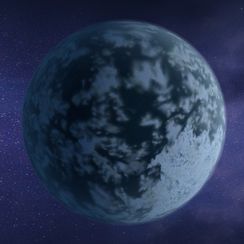
|
This wiki is closed in favour of the new wiki. Information shown is likely to be very out of date. |
Difference between revisions of "Planet Edmonton"
From Discovery Wiki
Jump to navigationJump to searchm (pic file fixed) |
m (Infocard link & Category added) |
||
| Line 1: | Line 1: | ||
| − | {{Version|4. | + | {{Version|4.91}} |
{{Planet Infobox | {{Planet Infobox | ||
| name = Planet Edmonton | | name = Planet Edmonton | ||
| Line 15: | Line 15: | ||
| escape_velocity = 11.87 km/sec | | escape_velocity = 11.87 km/sec | ||
}} | }} | ||
| − | Millions of years ago, Edmonton was a warm green world full of life and possibly suitable for human colonization. Scientists presume that the planet's orbit changed due to a cataclysm of unknown nature. Receiving much less sunlight than before, temperatures on Edmonton's surface steeply declined. Despite the cold environment, some of the most primitive living beings have evolved to survive. The planet has incredible potential for xenobiologists, since many of its surviving life forms were never encountered elsewhere in Sirius, and remnants of many larger animals, including mammals, can still be found within the planet's vast glaciers. | + | Millions of years ago, Edmonton was a warm green world full of life and possibly suitable for human colonization. Scientists presume that the planet's orbit changed due to a cataclysm of unknown nature. Receiving much less sunlight than before, temperatures on Edmonton's surface steeply declined. Despite the cold environment, some of the most primitive living beings have evolved to survive. The planet has incredible potential for xenobiologists, since many of its surviving life forms were never encountered elsewhere in [[Sirius]], and remnants of many larger animals, including mammals, can still be found within the planet's vast glaciers. |
| + | |||
| + | |||
| + | [[Category: Liberty]] | ||
Revision as of 14:31, 2 December 2018
| Planet Edmonton | |
| Location | 3D, Alberta |
| Technical information | |
| Docking | No |
| Terrain | Ice |
| Diameter | 14,152 km |
| Mass | 6.94 x 10e24 kg |
| Temperature | -114°C to -39°C |
| Escape velocity | 11.87 km/sec |
Millions of years ago, Edmonton was a warm green world full of life and possibly suitable for human colonization. Scientists presume that the planet's orbit changed due to a cataclysm of unknown nature. Receiving much less sunlight than before, temperatures on Edmonton's surface steeply declined. Despite the cold environment, some of the most primitive living beings have evolved to survive. The planet has incredible potential for xenobiologists, since many of its surviving life forms were never encountered elsewhere in Sirius, and remnants of many larger animals, including mammals, can still be found within the planet's vast glaciers.
